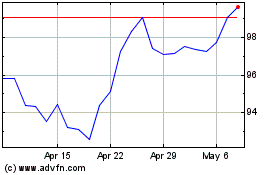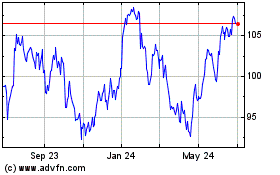Costco, J&J Spar Over Contact-Lens Business
April 15 2016 - 4:15PM
Dow Jones News
By Sarah Nassauer
Costco Wholesale Corp., 1-800 Contacts and other retailers
attacked newly proposed legislation they say would water down a
federal law that opened eye doctors to competition from online
sellers and discounters.
The U.S. Senate bill concerning contact lens was introduced this
week by Sen. Bill Cassidy (R., La.), a physician, and Sen. John
Boozman (R., Ark.), a former optometrist, and is backed by the
American Optometric Association as well as Johnson & Johnson
and Alcon, the eye-care unit of Novartis AG.
Unlike most physicians, many optometrists make money from
filling the prescriptions they write. They provide eye exams and
then sell glasses and contact lenses. But ever since a 2004 federal
law required optometrists to give patients their contact-lens
prescriptions or allow a retailer to ask on their behalf, many of
those sales have moved to online rivals like 1-800 Contacts or
discounters like Costco.
Under the 2004 law, a retailer must attempt to verify a
contact-lens prescription but can proceed with the sale unless the
doctor communicates any concerns within eight hours. The new
legislation says a prescription cannot be filled until a retailer
obtains "affirmative confirmation" if the doctor raises concerns by
phone, fax or email within eight hours. It also requires retailers
to provide a toll-free number or email for doctors to communicate
concerns.
"We have found repeatedly that [optometrists] block efforts to
fill a prescription," Brian Bethers, chief executive of 1-800
Contacts, said. "This is a very intentional effort to convert
passive verification into positive verification."
The bill makes it easier for doctors to voice any concerns about
a prescription, said Steven Loomis, president of the American
Optometric Association. The legislation would stop a sale until an
accurate prescription is provided if there are concerns, says Dr.
Loomis. "This challenges the issue of passive verification."
The legislation is the latest twist in a long-running battle
over the estimated 40 million Americans that buy contact lenses.
Manufacturers like J&J have been fighting to keep contact-lens
sales inside optometrists' offices because doctors -- with which
manufacturers develop relationships -- decide the brand that
patients use, opponents of the bill say. Prescriptions for contact
lenses are brand specific.
Costco won a victory this week when J&J, which has about 30%
of the U.S. market, said it would abandon a policy that prevented
retailers from charging less than a minimum price set by the
manufacturer. Costco had challenged the practice last year in an
antitrust lawsuit, which is still pending. Other big contact-lens
makers, including Alcon and Bausch & Lomb, however, said Friday
they would continue to enforce minimum prices.
"We are clearly at a crossroads where the doctor-patient
relationship and eye health are clearly at risk," said Peter
Menziuso, president of J&J's eye-care business in North
America. The company, in bending on minimum prices, wants to focus
its resources on "what is critically important and it's that
federal legislation," Mr. Menziuso said.
Costco says the legislation would increase costs for consumers
and make it harder to buy contact lenses at its stores. The
warehouse club has eye doctors in some of its locations but says
around 45% of its contact-lens prescriptions come from outside
doctors.
The retailer is fighting against "barriers thrown up by doctors
who prefer that they, rather than Costco, sell our members contact
lenses," said Richard Chavez, a senior vice president at the
retailer. "I don't blame them...but the reality is sometimes there
are better ways to do something," Mr. Chavez said. The new rule
"circumvents that eight-hour limitation," he said.
The legislation doesn't circumvent the eight-hour requirement,
according to a spokesman for Sen. Cassidy, because doctors are
required to send a valid prescription if they raise a concern about
the original one. "The seller will always have an accurate
prescription to fill within the eight-hour period," he said.
Fast-growing online eyeglass retailer Warby Parker said it
opposes the legislation. "If passed and signed into law, contact
lenses will become more expensive and take longer to receive," said
Neil Blumenthal, co-CEO of Warby Parker. "We worry that the same
forces pushing to make it more difficult to buy contact lenses will
do the same for eyeglasses."
Write to Sarah Nassauer at sarah.nassauer@wsj.com
(END) Dow Jones Newswires
April 15, 2016 16:00 ET (20:00 GMT)
Copyright (c) 2016 Dow Jones & Company, Inc.
Novartis (NYSE:NVS)
Historical Stock Chart
From Mar 2024 to Apr 2024

Novartis (NYSE:NVS)
Historical Stock Chart
From Apr 2023 to Apr 2024
